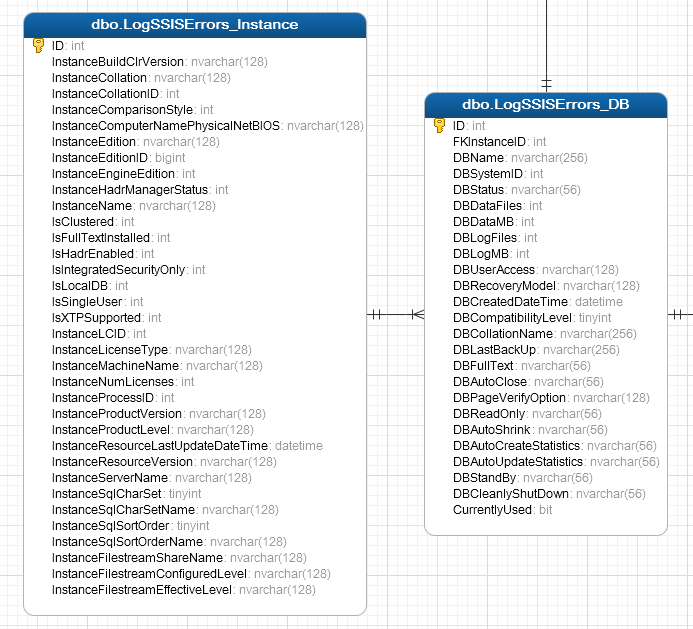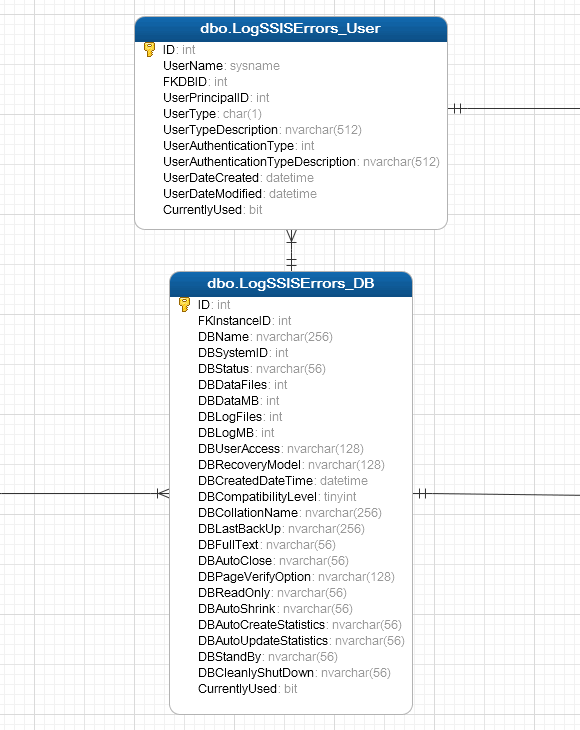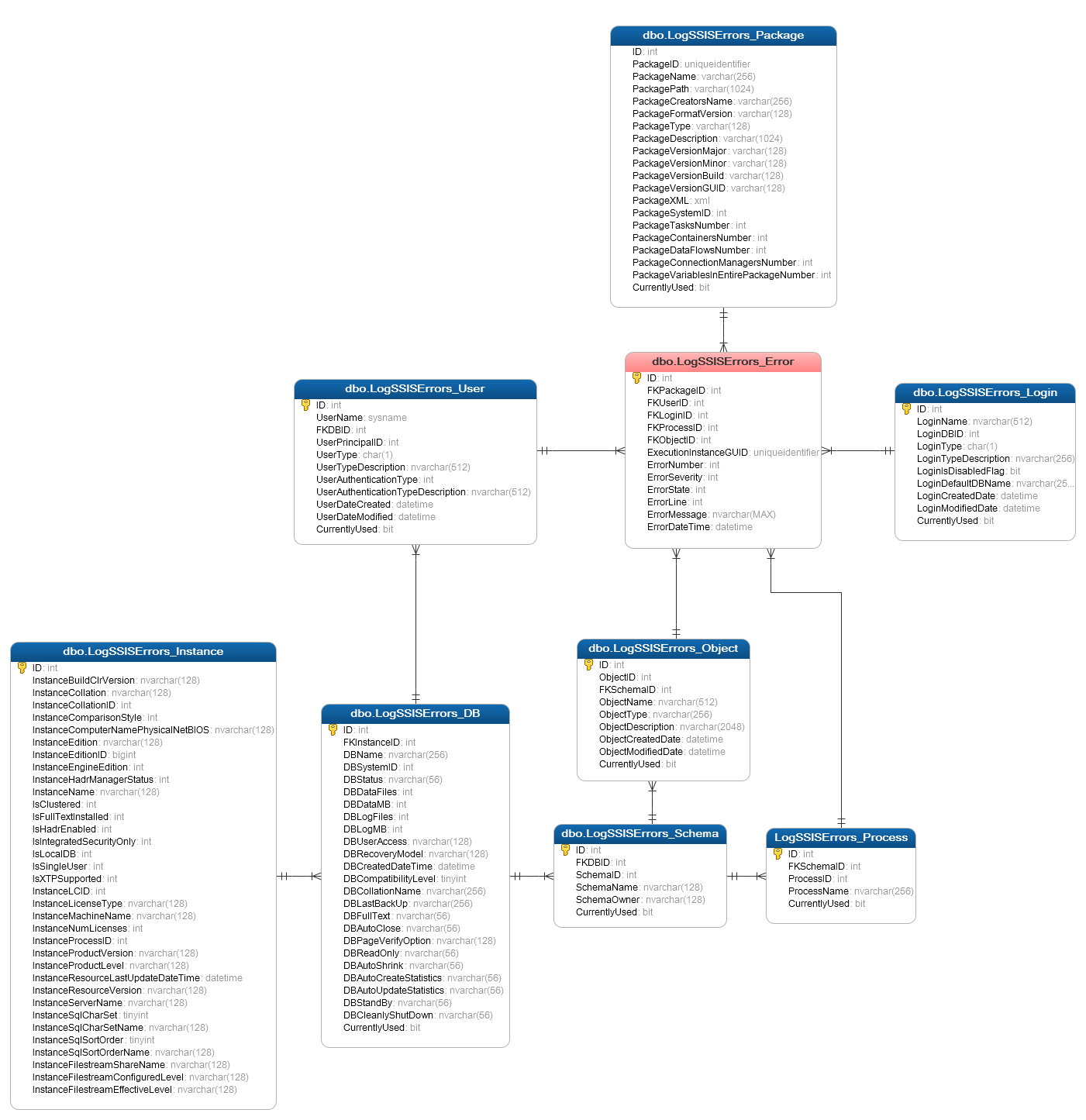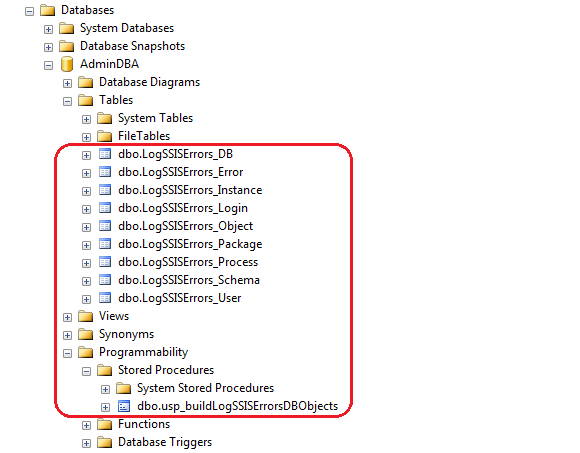How to create a simple ETL/stored procedure error capturing database (schema model, SQL code and implementation) – Part 1
Introduction
Two part series (second part can be found HERE) on how to create and implement an ETL execution error capturing database (schema model, SQL code, implementation etc.) based on Microsoft SQL Server stored procedures default error handling capabilities.
TL;DR Version
My last client engagement required me to create an ETL errors tracking solution which would serve as a central repository for all data related to SSIS packages execution failures. Given the initial scope and assumptions pointed to a small project size, thus the number of ETL routines involved kept at a minimum, my first intention was to build a single table encompassing all key information related to the package metadata and execution state. However, as the project grew in size, execs started to demand richer, more detailed data and the constricting schema of a single table became too evident, I decided to expand it with a proper relational database schema with additional metadata attributes at all common data-grouping hierarchies i.e. instance, database, schema and objects. In addition, I have also extracted metadata pertaining to users, logins and packages which complemented the whole data set with a comprehensive suite of variables for error-related analysis. Please note that this model and the subsequently discussed implementation is based primarily on capturing errors resulting from stored procedures execution as per my project demands. Since version 2012, SQL Server included the SSISDB catalog as the central point for working with Integration Services (SSIS) projects deployed to the Integration Services server which contains a rich set of data for all execution eventualities and should be treated as a default logging option for comprehensive SSIS runtime events capture.
Below is a breakdown of a database schema model which accounts for most of the database-related objects as well as some handy information on individual packages, logins and users. First up, we have instance and database data specific tables – LogSSISErrors_Instance and LogSSISErrors_DB – in a one-to-many relationship i.e. one SQL Server instance to multiple databases.
As each database can have multiple schemas, LogSSISErrors_DB has a one-to-many relationship to LogSSISErrors_Schema table, which in turn can be further related to LogSSISErrors_Object and LogSSISErrors_Process tables, each storing object-level data. The only distinction between ‘Object’ and ‘Process’ specific tables is the fact that ‘Object’ table stores table and view metadata whereas ‘Process’ table is concerned with stored procedures, assemblies, functions and triggers, even though on the database level they are all technically treated as objects.
Both, LogSSISErrors_Object and LogSSISErrors_Process have a one-to-many relationship with LogSSISErrors_Error table – the centrepiece of all the logging activities. LogSSISErrors_Error table is also linked up with LogSSISErrors_User, LogSSISErrors_Package and LogSSISErrors_Login tables, storing users, local SSIS packages and logins metadata.
LogSSISErrors_user table is also connected to LogSSISErrors_DB table as one database can have multiple users created against it.
Full entity relational diagram for AdminDBA is as per the image below.
All the data represented by the above schema, with the exception of LogSSISErrors_Package table entries, should be available by querying either catalog views, information schema views or system stored procedures/functions. Most of the tables names are self-explanatory and can be easily referred back to the function they play and relevant metadata information. In case of LogSSISErrors_Process and LogSSISError_Object, these tables’ data comes from the same query with the distinction made on the object type i.e. view and tables, whereas stored procedures are bucketed as processes (even though technically they are objects too), thus placed in the LogSSISErrors_Process table. In case of LogSSISErrors_Package table, the package metadata is not stored on the server level but can be sourced from a .dtsx file using T-SQL. This part of solution was made available thanks to Jamie Thompson’s scripts which you can read about in detail in his post HERE, I simply adopted his technique for my solution.
The script used to create all database objects and populate those with SQL Server instance metadata is close to 1800 lines long so in this post I’ll only go through sections of it, skipping all the boilerplate SQL; however, a full working version is available for download from my OneDrive folder HERE. The script is divided into a few sections, main parts being AdminDBA database metadata collection for subsequent objects recreation and second part determined by a conditional logic where a counts of foreign key constraints and a count of tables from two table variables created is compared.
First part creates two table variables storing objects AdminDBA objects metadata and foreign key constraints referencing individual tables. If those tables have already been created and relationships exist, than the rest of the script utilizes this metadata in subsequent execution. The following T-SQL generates table variables and their content.
DECLARE @TempFKs TABLE
(
ID INT IDENTITY(1, 1)
NOT NULL ,
Foreign_Key_Name VARCHAR(512) ,
Parent_Object_Name VARCHAR(256) ,
Referenced_Object_Name VARCHAR(256) ,
Parent_Column_Name VARCHAR(256) ,
Referenced_Column_Name VARCHAR(256)
)
INSERT INTO @TempFKs
( Foreign_Key_Name ,
Parent_Object_Name ,
Referenced_Object_Name ,
Parent_Column_Name ,
Referenced_Column_Name
)
SELECT fk.name AS foreign_key_name ,
po.name AS parent_object_name ,
ro.name AS referenced_object_name ,
pc.name AS parent_column_name ,
rc.name AS referenced_column_name
FROM sys.foreign_key_columns fc
JOIN sys.columns pc ON pc.column_id = parent_column_id
AND parent_object_id = pc.object_id
JOIN sys.columns rc ON rc.column_id = referenced_column_id
AND referenced_object_id = rc.object_id
JOIN sys.objects po ON po.object_id = pc.object_id
JOIN sys.objects ro ON ro.object_id = rc.object_id
JOIN sys.foreign_keys fk ON fk.object_id = fc.constraint_object_id
WHERE ro.type = 'U'
AND fk.type = 'F'
DECLARE @TempTbls TABLE
(
ID INT IDENTITY(1, 1)
NOT NULL ,
Table_Name VARCHAR(128) NOT NULL ,
Table_Schema_Definition VARCHAR(MAX) NOT NULL
)
INSERT INTO @TempTbls
( Table_Name ,
Table_Schema_Definition
)
SELECT so.name AS Table_Name ,
'create table [' + so.name + '] (' + STUFF(o.list, LEN(o.list),
1, '') + ')'
+ CASE WHEN tc.CONSTRAINT_NAME IS NULL THEN ''
ELSE 'ALTER TABLE ' + so.name + ' ADD CONSTRAINT '
+ tc.CONSTRAINT_NAME + ' PRIMARY KEY ' + ' ('
+ LEFT(j.list, LEN(j.list) - 1) + ')'
END AS Table_Schema_Definition
FROM sysobjects so
CROSS APPLY ( SELECT ' [' + COLUMN_NAME + '] ' + DATA_TYPE
+ CASE DATA_TYPE
WHEN 'sql_variant' THEN ''
WHEN 'text' THEN ''
WHEN 'ntext' THEN ''
WHEN 'xml' THEN ''
WHEN 'decimal'
THEN '('
+ CAST(NUMERIC_PRECISION AS VARCHAR)
+ ', '
+ CAST(NUMERIC_SCALE AS VARCHAR)
+ ')'
ELSE COALESCE('('
+ CASE
WHEN CHARACTER_MAXIMUM_LENGTH = -1
THEN 'MAX'
ELSE CAST(CHARACTER_MAXIMUM_LENGTH AS VARCHAR)
END + ')', '')
END + ' '
+ CASE WHEN EXISTS ( SELECT
id
FROM
syscolumns
WHERE
OBJECT_NAME(id) = so.name
AND name = column_name
AND COLUMNPROPERTY(id,
name,
'IsIdentity') = 1 )
THEN 'IDENTITY('
+ CAST(IDENT_SEED(so.name) AS VARCHAR)
+ ','
+ CAST(IDENT_INCR(so.name) AS VARCHAR)
+ ')'
ELSE ''
END + ' '
+ ( CASE WHEN IS_NULLABLE = 'No'
THEN 'NOT '
ELSE ''
END ) + 'NULL '
+ CASE WHEN INFORMATION_SCHEMA.COLUMNS.COLUMN_DEFAULT IS NOT NULL
THEN 'DEFAULT '
+ INFORMATION_SCHEMA.COLUMNS.COLUMN_DEFAULT
ELSE ''
END + ', '
FROM INFORMATION_SCHEMA.COLUMNS
WHERE TABLE_NAME = so.name
ORDER BY ORDINAL_POSITION
FOR
XML PATH('')
) o ( list )
LEFT JOIN INFORMATION_SCHEMA.TABLE_CONSTRAINTS tc ON tc.TABLE_NAME = so.name
AND tc.CONSTRAINT_TYPE = 'PRIMARY KEY'
CROSS APPLY ( SELECT '[' + COLUMN_NAME + '], '
FROM INFORMATION_SCHEMA.KEY_COLUMN_USAGE kcu
WHERE kcu.CONSTRAINT_NAME = tc.CONSTRAINT_NAME
ORDER BY ORDINAL_POSITION
FOR
XML PATH('')
) j ( list )
WHERE xtype = 'U'
AND name NOT IN ( 'dtproperties' )
By design, after the the database and objects have been (re)created, the number of foreign key constraints should be one fewer than the number of tables. The below piece of SQL compares the counts of foreign key constraints and the count of tables from two table variables at which point one of the two possible scenarios can be triggered – if the count is comparable than the objects are re-created using the data encapsulated in table variables which already store DDL code for individual tables as well as foreign key constraints. If, on the other hand, the count is not comparable, a different part of stored procedure gets executed, this time responsible for recreating objects based on the hard-coded DDL statements and foreign key constraints.
IF NOT EXISTS ( SELECT COUNT(*) - 1 AS ct
FROM @TempFKs a
EXCEPT
SELECT COUNT(*)
FROM @TempTbls b )
AND EXISTS ( SELECT TOP 1 1 FROM @TempTbls )
Most of the SQL Server databases’ metadata comes from storing the results of the below query which extracts database, schema and objects information for each database and temporarily stores it in a table variable.
SET @SQL = N'';
SELECT
@SQL = @SQL + ' UNION ALL
SELECT
[database] = ''' + name + ''',
[schema] = s.name COLLATE Latin1_General_CI_AI,
[schemaid] = s.schema_id,
[schemaowner] = dp.name COLLATE Latin1_General_CI_AI,
[processobjectname] = ob.name COLLATE Latin1_General_CI_AI,
[processobjectid] = ob.object_id,
[processobjectschemaid] = ob.schema_id,
[ProcessObjectDescription] = NULL,
[processobjecttype] = CASE
WHEN ob.type = ''AF'' THEN ''Aggregate Function''
WHEN ob.type = ''C'' THEN ''Check Constraint''
WHEN ob.type = ''D'' THEN ''Default Constraint''
WHEN ob.type = ''F'' THEN ''Foreign Key Constraint''
WHEN ob.type = ''FN'' THEN ''SQL Scalar Function''
WHEN ob.type = ''FS'' THEN ''Assembly Scalar Function''
WHEN ob.type = ''FT'' THEN ''Assembly Table Valued Function''
WHEN ob.type = ''IF'' THEN ''SQL Inline Table-valued Function''
WHEN ob.type = ''IT'' THEN ''Internal Table''
WHEN ob.type = ''P'' THEN ''SQL Stored Procedure''
WHEN ob.type = ''PC'' THEN ''Assembly Stored Procedure''
WHEN ob.type = ''PG'' THEN ''Plan Guide''
WHEN ob.type = ''PK'' THEN ''Primary Key Constraint''
WHEN ob.type = ''R'' THEN ''Rule''
WHEN ob.type = ''RF'' THEN ''Replication Filter Procedure''
WHEN ob.type = ''S'' THEN ''System Base Table''
WHEN ob.type = ''SN'' THEN ''Synonym''
WHEN ob.type = ''SO'' THEN ''Sequence Object''
WHEN ob.type = ''SQ'' THEN ''Service Queue''
WHEN ob.type = ''TA'' THEN ''Assembly DML Trigger''
WHEN ob.type = ''TF'' THEN ''SQL Table Table Valued Function''
WHEN ob.type = ''TR'' THEN ''SQL DML Trigger''
WHEN ob.type = ''TT'' THEN ''Table Type''
WHEN ob.type = ''U'' THEN ''User Defined Table''
WHEN ob.type = ''UQ'' THEN ''Unique Constraint''
WHEN ob.type = ''V'' THEN ''View''
WHEN ob.type = ''X'' THEN ''Extended Stored Procedure''
ELSE ''Unknown Object Type''
END,
[createdate] = CAST(ob.create_date as date),
[modifieddate] = CAST(ob.modify_date as date)
FROM ' + QUOTENAME(name) + '.sys.schemas AS s
INNER JOIN ' + QUOTENAME(name)
+ '.sys.database_principals dp
on s.principal_id = dp.principal_id
INNER JOIN ' + QUOTENAME(name) + '.sys.objects AS ob
ON s.[schema_id] = ob.[schema_id]
where s.name <> ''sys'''
FROM sys.databases
WHERE database_id > 4
AND name NOT IN ( 'ReportServer$SQL2014_MULTIDIM',
'ReportServer$SQL2014_MULTIDIMTempDB' );
SET @SQL = @SQL + N' ORDER BY [database],[schema];';
SET @SQL = STUFF(@SQL, 1, 11, '');
DECLARE @EnumDBMeta TABLE
(
ID INT NOT NULL
IDENTITY(1, 1) ,
DBName NVARCHAR(128) ,
SchemaName NVARCHAR(128) ,
SchemaID INT ,
SchemaOwner NVARCHAR(128) ,
ProcessObjectName NVARCHAR(128) ,
ProcessObjectID INT ,
ProcessObjectSchemaID INT ,
ProcessObjectDescription NVARCHAR(2048) ,
ProcessObjectType NVARCHAR(128) ,
ProcessObjectCreatedDate DATE ,
ProcessObjectModifiedDate DATE
)
INSERT INTO @EnumDBMeta
( DBName ,
SchemaName ,
SchemaID ,
SchemaOwner ,
ProcessObjectName ,
ProcessObjectID ,
ProcessObjectSchemaID ,
ProcessObjectDescription ,
ProcessObjectType ,
ProcessObjectCreatedDate ,
ProcessObjectModifiedDate
)
EXEC sp_executesql @SQL
Instance level metadata comes mainly from appending different arguments to a SERVERPROPERTY function to return instance-specific information. Database users metadata comes from sys.database_principals, whereas login details are returned from sys.server_principals catalog views.
SSIS package metadata is a little bit more complex to interrogate. In case of LogSSISErrors_Package table, the package metadata is not stored on the server level but can be sourced from a .dtsx file using T-SQL. As mentioned before, this part of solution was made available thanks to Jamie Thompson’s scripts which you can read about in detail in his post HERE. This part of script accesses the file system and reads .dtsx XML content, storing relevant attributes in LogSSISErrors_Package table.
EXEC sp_configure 'show advanced options', 1;
RECONFIGURE;
EXEC sp_configure 'xp_cmdshell', 1;
RECONFIGURE;
DECLARE @Path VARCHAR(2000);
SET @Path = 'C:\*.dtsx';
--Must be of form [drive letter]\...\*.dtsx
DECLARE @MyFiles TABLE
(
MyID INT IDENTITY(1, 1)
PRIMARY KEY ,
FullPath VARCHAR(2000)
);
DECLARE @CommandLine VARCHAR(4000);
SELECT @CommandLine = LEFT('dir "' + @Path + '" /A-D /B /S ', 4000);
INSERT INTO @MyFiles
( FullPath )
EXECUTE xp_cmdshell @CommandLine;
DELETE FROM @MyFiles
WHERE FullPath IS NULL
OR FullPath = 'File Not Found'
OR FullPath = 'The system cannot find the path specified.'
OR FullPath = 'The system cannot find the file specified.';
IF EXISTS ( SELECT *
FROM sys.tables
WHERE name = N'pkgStats' )
DROP TABLE pkgStats;
CREATE TABLE pkgStats
(
PackagePath VARCHAR(900) NOT NULL
PRIMARY KEY ,
PackageXML XML NOT NULL
);
DECLARE @FullPath VARCHAR(2000);
DECLARE file_cursor CURSOR
FOR
SELECT FullPath
FROM @MyFiles;
OPEN file_cursor
FETCH NEXT FROM file_cursor INTO @FullPath;
WHILE @@FETCH_STATUS = 0
BEGIN
SET @SQL = '
INSERT pkgStats (PackagePath,PackageXML)
select ''@FullPath'' as PackagePath
, cast(BulkColumn as XML) as PackageXML
from openrowset(bulk ''@FullPath'',
single_blob) as pkgColumn';
SELECT @SQL = REPLACE(@SQL, '@FullPath', @FullPath);
EXEC sp_executesql @SQL;
FETCH NEXT FROM file_cursor INTO @FullPath;
END
CLOSE file_cursor;
DEALLOCATE file_cursor;
DECLARE @pkgStatsBase TABLE
(
PackagePath VARCHAR(900) ,
PackageId UNIQUEIDENTIFIER ,
PackageCreatorsName NVARCHAR(500) ,
PackageFormatVersion SMALLINT ,
PackageType NVARCHAR(50) ,
PackageDescription NVARCHAR(2000) ,
PackageVersionMajor SMALLINT ,
PackageVersionMinor SMALLINT ,
PackageVersionBuild SMALLINT ,
PackageVersionGUID UNIQUEIDENTIFIER ,
PackageXML XML
);
INSERT INTO @pkgStatsBase
SELECT PackagePath ,
CAST(PackageXML.value('declare namespace DTS="www.microsoft.com/SqlServer/Dts";
/DTS:Executable[1]/DTS:Property[@DTS:Name=''DTSID''][1]',
'nvarchar(500)') AS UNIQUEIDENTIFIER) AS PackageID ,
PackageXML.value('declare namespace DTS="www.microsoft.com/SqlServer/Dts";
/DTS:Executable[1]/DTS:Property[@DTS:Name=''CreatorName''][1]',
'nvarchar(500)') AS PackageCreatorsName ,
CAST(PackageXML.value('declare namespace DTS="www.microsoft.com/SqlServer/Dts";
/DTS:Executable[1]/DTS:Property[@DTS:Name=''PackageFormatVersion''][1]',
'varchar(3)') AS SMALLINT) AS PackageFormatVersion ,
CAST(PackageXML.value('declare namespace DTS="www.microsoft.com/SqlServer/Dts";
DTS:Executable[1]/@DTS:ExecutableType[1]',
'nvarchar(50)') AS NVARCHAR(50)) AS PackageType ,
PackageXML.value('declare namespace DTS="www.microsoft.com/SqlServer/Dts";
/DTS:Executable[1]/DTS:Property[@DTS:Name=''Description''][1]',
'nvarchar(2000)') AS PackageDescription ,
CAST(PackageXML.value('declare namespace DTS="www.microsoft.com/SqlServer/Dts";
/DTS:Executable[1]/DTS:Property[@DTS:Name=''VersionMajor''][1]',
'varchar(3)') AS SMALLINT) AS PackageVersionMajor ,
CAST(PackageXML.value('declare namespace DTS="www.microsoft.com/SqlServer/Dts";
/DTS:Executable[1]/DTS:Property[@DTS:Name=''VersionMinor''][1]',
'varchar(3)') AS SMALLINT) AS PackageVersionMinor ,
CAST(PackageXML.value('declare namespace DTS="www.microsoft.com/SqlServer/Dts";
/DTS:Executable[1]/DTS:Property[@DTS:Name=''VersionBuild''][1]',
'varchar(3)') AS SMALLINT) AS PackageVersionBuild ,
CAST(PackageXML.value('declare namespace DTS="www.microsoft.com/SqlServer/Dts";
/DTS:Executable[1]/DTS:Property[@DTS:Name=''VersionGUID''][1]',
'char(38)') AS UNIQUEIDENTIFIER) AS PackageVersionGUID ,
PackageXML
FROM pkgStats
DECLARE @AllpkgStats TABLE
(
PackageId UNIQUEIDENTIFIER NULL ,
PackagePath VARCHAR(900) PRIMARY KEY
NOT NULL ,
PackageName VARCHAR(900) NULL ,
PackageCreatorsName NVARCHAR(500) NULL ,
PackageFormatVersion SMALLINT NULL ,
PackageType NVARCHAR(50) NULL ,
PackageDescription NVARCHAR(2000) NULL ,
PackageVersionMajor SMALLINT NULL ,
PackageVersionMinor SMALLINT NULL ,
PackageVersionBuild SMALLINT NULL ,
PackageVersionGUID UNIQUEIDENTIFIER NULL ,
PackageTasksNumber INT NULL ,
PackageContainersNumber INT NULL ,
PackageDataFlowsNumber INT NULL ,
PackageConnectionManagersNumber INT NULL ,
PackageVariablesInEntirePackageNumber INT NULL ,
PackageXML XML NULL
);
INSERT INTO @AllpkgStats
( PackageId ,
PackagePath ,
PackageName ,
PackageCreatorsName ,
PackageFormatVersion ,
PackageType ,
PackageDescription ,
PackageVersionMajor ,
PackageVersionMinor ,
PackageVersionBuild ,
PackageVersionGUID ,
PackageXML
)
SELECT p.PackageId ,
p.PackagePath ,
SUBSTRING(PackagePath,
LEN(PackagePath) - CHARINDEX('\',
REVERSE(PackagePath), 0)
+ 2, LEN(PackagePath)) AS PackageName ,
p.PackageCreatorsName ,
p.PackageFormatVersion ,
p.PackageType ,
p.PackageDescription ,
p.PackageVersionMajor ,
p.PackageVersionMinor ,
p.PackageVersionBuild ,
p.PackageVersionGUID ,
p.PackageXML
FROM @pkgStatsBase p;
--Number of tasks
MERGE INTO @AllpkgStats AS t
USING
( SELECT PackagePath ,
COUNT(*) AS PackageTasksNumber
FROM @pkgStatsBase p
CROSS APPLY p.PackageXML.nodes('declare namespace DTS="www.microsoft.com/SqlServer/Dts";
//DTS:Executable[@DTS:ExecutableType!=''STOCK:SEQUENCE''
and @DTS:ExecutableType!=''STOCK:FORLOOP''
and @DTS:ExecutableType!=''STOCK:FOREACHLOOP''
and not(contains(@DTS:ExecutableType,''.Package.''))]') Pkg ( props )
GROUP BY PackagePath
) s
ON ( t.PackagePath = s.PackagePath )
WHEN MATCHED THEN
UPDATE SET PackageTasksNumber = s.PackageTasksNumber;
--Number of containers
MERGE INTO @AllpkgStats AS t
USING
( SELECT PackagePath ,
COUNT(*) AS PackageContainersNumber
FROM @pkgStatsBase p
CROSS APPLY p.PackageXML.nodes('declare namespace DTS="www.microsoft.com/SqlServer/Dts";
//DTS:Executable[@DTS:ExecutableType=''STOCK:SEQUENCE''
or @DTS:ExecutableType=''STOCK:FORLOOP''
or @DTS:ExecutableType=''STOCK:FOREACHLOOP'']') Pkg ( props )
GROUP BY PackagePath
) s
ON ( t.PackagePath = s.PackagePath )
WHEN MATCHED THEN
UPDATE SET PackageContainersNumber = s.PackageContainersNumber
WHEN NOT MATCHED BY SOURCE THEN
UPDATE SET PackageContainersNumber = 0;
--Number of data flows
MERGE INTO @AllpkgStats AS t
USING
( SELECT PackagePath ,
COUNT(*) AS PackageDataFlowsNumber
FROM @pkgStatsBase p
CROSS APPLY p.PackageXML.nodes('declare namespace DTS="www.microsoft.com/SqlServer/Dts";
//DTS:Executable[contains(@DTS:ExecutableType,''.Pipeline.'')]') Pkg ( props )
GROUP BY PackagePath
) s
ON ( t.PackagePath = s.PackagePath )
WHEN MATCHED THEN
UPDATE SET PackageDataFlowsNumber = s.PackageDataFlowsNumber
WHEN NOT MATCHED BY SOURCE THEN
UPDATE SET PackageDataFlowsNumber = 0;
--Number of connection managers
MERGE INTO @AllpkgStats AS t
USING
( SELECT PackagePath ,
COUNT(*) AS PackageConnectionManagersNumber
FROM @pkgStatsBase p
CROSS APPLY p.PackageXML.nodes('declare namespace DTS="www.microsoft.com/SqlServer/Dts";
//DTS:ConnectionManager') Pkg ( props )
GROUP BY PackagePath
) s
ON ( t.PackagePath = s.PackagePath )
WHEN MATCHED THEN
UPDATE SET PackageConnectionManagersNumber = s.PackageConnectionManagersNumber
WHEN NOT MATCHED BY SOURCE THEN
UPDATE SET PackageConnectionManagersNumber = 0;
--Number of variables in entire package
MERGE INTO @AllpkgStats AS t
USING
( SELECT PackagePath ,
COUNT(*) AS PackageVariablesInEntirePackageNumber
FROM @pkgStatsBase p
CROSS APPLY p.PackageXML.nodes('declare namespace DTS="www.microsoft.com/SqlServer/Dts";
//DTS:Variable') Pkg ( props )
GROUP BY PackagePath
) s
ON ( t.PackagePath = s.PackagePath )
WHEN MATCHED THEN
UPDATE SET PackageVariablesInEntirePackageNumber = s.PackageVariablesInEntirePackageNumber
WHEN NOT MATCHED BY SOURCE THEN
UPDATE SET PackageVariablesInEntirePackageNumber = 0;
INSERT INTO AdminDBA.dbo.LogSSISErrors_Package
( PackageID ,
PackageName ,
PackagePath ,
PackageCreatorsName ,
PackageFormatVersion ,
PackageType ,
PackageDescription ,
PackageVersionMajor ,
PackageVersionMinor ,
PackageVersionBuild ,
PackageVersionGUID ,
PackageTasksNumber ,
PackageXML ,
PackageContainersNumber ,
PackageDataFlowsNumber ,
PackageConnectionManagersNumber ,
PackageVariablesInEntirePackageNumber ,
CurrentlyUsed
)
SELECT PackageId ,
PackageName ,
PackagePath ,
PackageCreatorsName ,
PackageFormatVersion ,
PackageType ,
PackageDescription ,
PackageVersionMajor ,
PackageVersionMinor ,
PackageVersionBuild ,
PackageVersionGUID ,
PackageTasksNumber ,
PackageXML ,
PackageContainersNumber ,
PackageDataFlowsNumber ,
PackageConnectionManagersNumber ,
PackageVariablesInEntirePackageNumber ,
1 AS CurrentlyUsed
FROM @AllpkgStats
IF EXISTS ( SELECT *
FROM sys.tables
WHERE name = N'pkgStats' )
DROP TABLE pkgStats;
EXEC sp_configure 'xp_cmdshell', 0;
RECONFIGURE;
EXEC sp_configure 'show advanced options', 0;
RECONFIGURE;
Upon execution completion this code should create a small set of tables starting with LogSSISErrors prefix and metadata entries in some or all tables based on your local SQL Server instance as per the image below.
In the NEXT POST I will go through the process of creating a sample test environment, an SSIS package running an error-generating process and another variation of the above stored procedure used to update the database as the environment changes occur. Also, all the code used in this solution can be downloaded from my OneDrive folder HERE.
http://scuttle.org/bookmarks.php/pass?action=addThis entry was posted on Wednesday, November 5th, 2014 at 5:48 am and is filed under Data Modelling, How To's, SQL. You can follow any responses to this entry through the RSS 2.0 feed. You can leave a response, or trackback from your own site.









admin September 1st, 2020 at 6:56 pm
To some extent – yes. I would use it as an additional solution for any transactional operations which need to have their error state captured for immediate reporting or error notifications. For SSIS package-specific execution details, especially information-level and audit details (not terminal errors), SSISDB metadata is a lot more comprehensive.